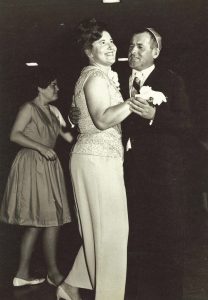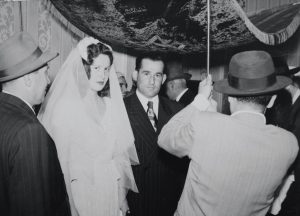(Well before the pandemic, I went back to Poland and Ukraine to see my parents’ homes and the places where my relatives were murdered. Here’s Part 1 of the travelogue. I’ll post the other parts in the weeks ahead.)
My mother:
“I went back home after the war to look for my father. An old neighbor saw me on the street and recognized me right away. ‘You have to come with me otherwise they will kill you,’ she said. I hid in her house overnight and left in the morning. Don’t ever go there.”
My father:
“Don’t ever visit. I went back home after the war and they tried to murder me by burning down my house with me in it. I had to shoot four people to get out alive. They remember me. If they see you, they’ll try to kill you in revenge.”
My mother and father were distant cousins. They didn’t know this. I didn’t know it until I looked at my DNA relatives on an online website and found out that all of them were related to me on both sides of my family. Even before DNA tests, it wouldn’t have been an outrageous hunch that my parents were related. They were Ashkenazi Jews born 90 kilometers apart. My mother came from a wealthy home in Tomaszow Lubelski. My father came from a poor one in Wlodzimierz. At the time of their births, both towns were in Poland. Now my father’s town is in Ukraine.
My mother survived the war because the Soviets sent her family to a Siberian gulag in September 1939. My father survived because he fled to Tashkent in the same month. All of my mother’s family made it through the war except for a few aunts, uncles and cousins who were murdered in Belzec. Everyone in my father’s family was murdered in a killing field in what is now Ukraine except for him and perhaps three first cousins.
My parents had a close and loving marriage that lasted forty plus years.
They met in America, Milwaukee to be precise. My father first spotted my mother from a distance of twenty yards as she walked out of a Sears, thought she was both beautiful and elegant, immediately sensed that she was a Polish Jew, followed her home, and smoked a few cigarettes outside while he waited for her to leave her home. He then knocked on my mother’s door and introduced himself to my grandmother, said that he earned a good salary as a union carpenter, and his intentions toward her daughter were honorable.
To say that I admire my parents would be a profound understatement. I am, in fact, in awe of them. That wasn’t always true. But I always respected my parents even while I deluded myself into thinking I was a next-generation, superior version of them. Both were well-tuned survival machines alert to any danger. As a family, we always had our passports ready and 10K of cash and gold stashed in a wall in case America turned into another Poland, Russia or Germany overnight. I would have arguments with my parents about this paranoia.
“You know what the difference is between the shit of Poland and here?” my mother once said to me. “Money. Take money away from Americans and they’ll be the same fascists as anywhere else.” I thought this proclamation, to which my father nodded in affirmation, was absurd at the time. Now when I see pictures of the Deplorables who attend Donald Trump’s rallies, I’m chagrinned.
 My parents worked morning, noon and night to make a good life for themselves and their two sons. When invited to a party, they would dance, smile, laugh, savor the meal, and my father would drink until his face glowed a bright red. They never read Tennyson, but were like his Ulysses. They drank “Life to the lees: all times” they “enjoyed greatly, have suffered greatly.” Theirs wasn’t a simple and pure joy, certainly. My father once looked at everyone dancing at a Polish Jewish wedding, smiled broadly, and said to me in Yiddish, “Look! Everybody is happy here. Hitler is watching us from above and he hates what he sees so much that he’s clawing his eyes out.” Never again have I heard a more mordant way of expressing the truism that living well is the best revenge.
My parents worked morning, noon and night to make a good life for themselves and their two sons. When invited to a party, they would dance, smile, laugh, savor the meal, and my father would drink until his face glowed a bright red. They never read Tennyson, but were like his Ulysses. They drank “Life to the lees: all times” they “enjoyed greatly, have suffered greatly.” Theirs wasn’t a simple and pure joy, certainly. My father once looked at everyone dancing at a Polish Jewish wedding, smiled broadly, and said to me in Yiddish, “Look! Everybody is happy here. Hitler is watching us from above and he hates what he sees so much that he’s clawing his eyes out.” Never again have I heard a more mordant way of expressing the truism that living well is the best revenge.
That wedding was like all events my parents experienced in America. It was viewed through the lens of the Shoah. It was a lens that all in my family held, including me. I know and have read about Jewish children whose parents lived through WWII and who never heard their parents’ stories. For them, the family’s past is a dark mystery. I can’t say that. I know hundreds of stories about my parents’ lives in Europe.
But while my mother and father were happy to tell stories about their past, they were adamant about never revisiting the places they once lived. Whenever I told my parents that I wanted to see their hometowns, they looked at me sternly and told me unequivocally that not only was this a dumb idea, it was also a dangerous one.
This taboo about revisiting the past was partly broken about two years before my mother died. My father had passed away several years before. I was teaching in Italy for a semester. My mother called to work out the details of her upcoming visit to see me and my family. Then she said something that made me put down the phone for a few seconds so I could compose myself. “I want to go to Germany with you,” she said. “I want to visit my DP (Displaced Persons) camp.”
“What? Why?” I asked.
“Because I was young and I was free for the first time in six years,” my mother said. “Those years in the DP camp were good ones.”
“I can borrow a car and we can drive there,” I said. “Do you want to go to Poland, too?”
“Poland!” my mother shouted over the phone. “Why would I want to go to that shithole?”
I smiled as I heard this. I had my mother back, not some strange woman fond of her days in Germany. We did go to Munich with my wife and daughter. My mother told stories non-stop while we walked around. We lasted two and a half days out of a planned four day visit before my mom looked at me and said, “This is enough. I need to get away from these goddamn Germans for good.” That trip was over twenty years ago.
I, of course, never lived in Poland, Ukraine or Germany. But my parents’ stories about their hometowns are still vivid and visceral to me. I’ve never felt particularly American even though I was born in Wisconsin and have spent almost all of my life in this country. English was not my first language. Yiddish was. Polish was my third language after English, which I learned from my brother and by watching TV sitcoms.
The worst insult my parents could throw my way was, “You’re acting like an American.” That meant I was being weak. I was being soft. It meant that if America ever turned into another Russia, Poland or Germany, I would be one of the first to die or end up in a gulag. I made sure to avoid “acting like an American” in my parents’ presence.
It’s probably true that I’ve been inconsistent about acting like an American outside my parents’ presence, too. Late at night or when I’m tired, I tend to fall into an accent that sounds more Eastern European than it does Midwestern.
Last year, I felt a renewed need to see the source of my parents’ stories. I longed to go to Poland and Ukraine. I knew this trip wouldn’t be for pleasure. I don’t possess the warm nostalgia for shtetls that I hear from third and fourth generation American Jews. My parents’ stories of Europe before the war were about how hard and awful Jewish life was for all but the wealthy. If I traveled to Poland and Ukraine, I expected to see a dark and depressing place, one where it would be best to keep my mouth shut.
I hope to be alive for at least another twenty years. But I don’t know how long I’ll continue to be healthy. This was the year to go. It was also necessary to go by myself. I would have gone with my brother if he had still been alive. I knew I’d be blue and pensive. He would have been that way, too.


Recent Comments